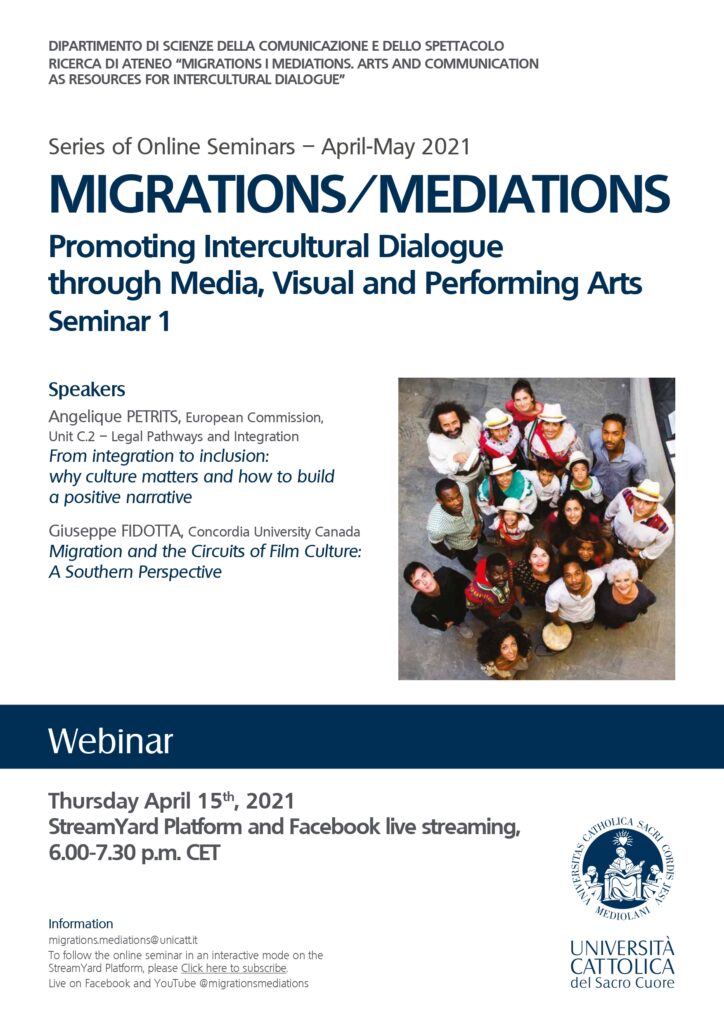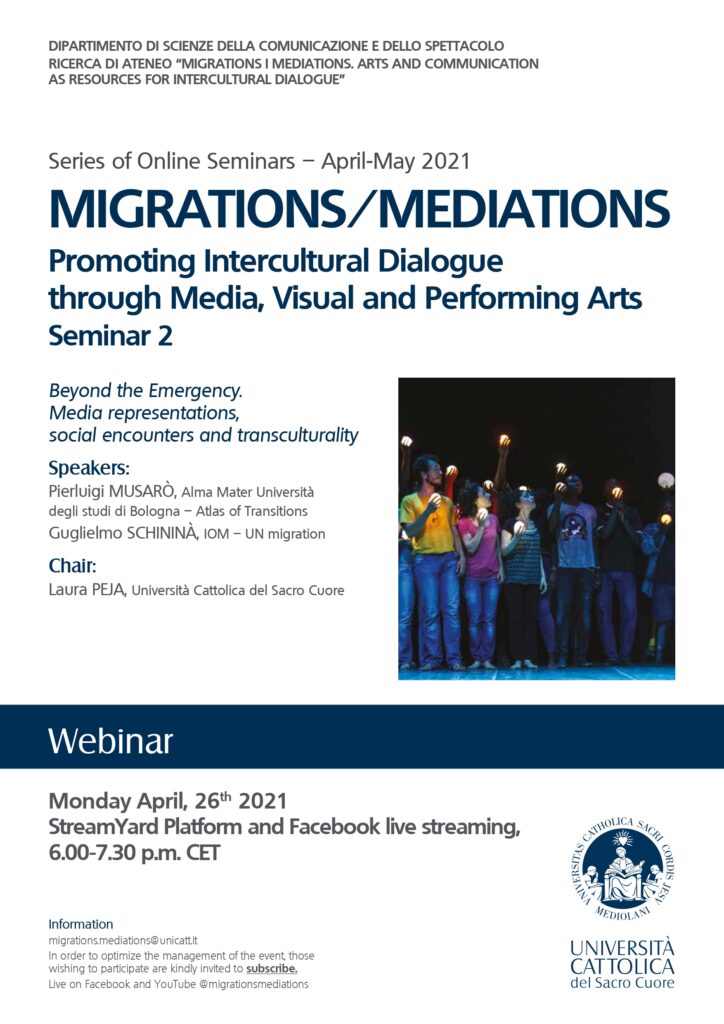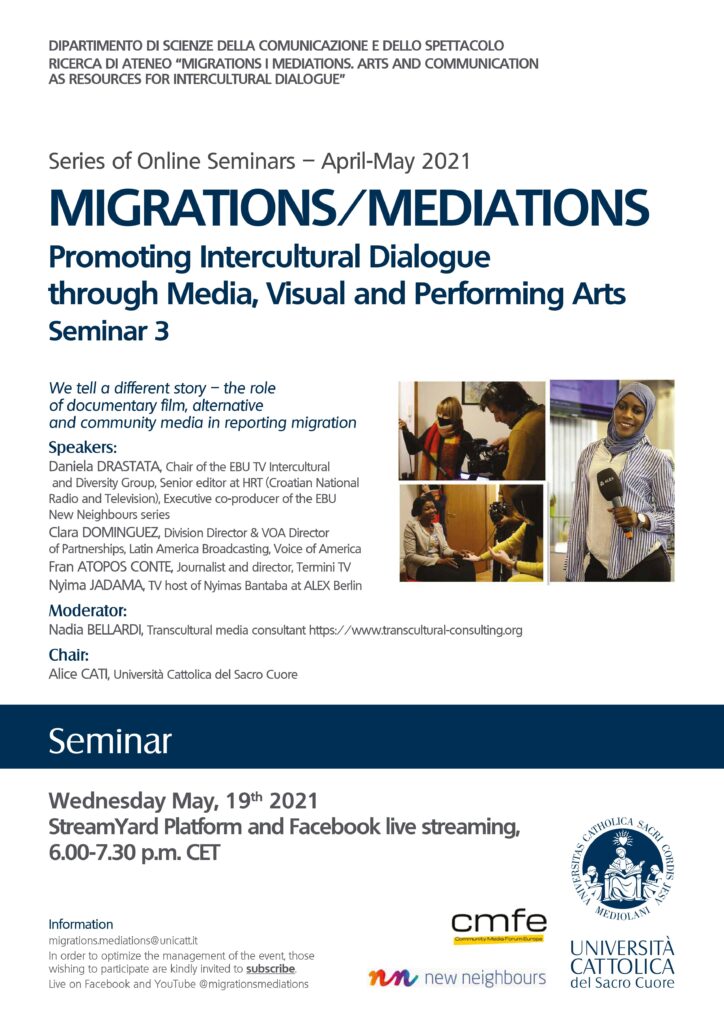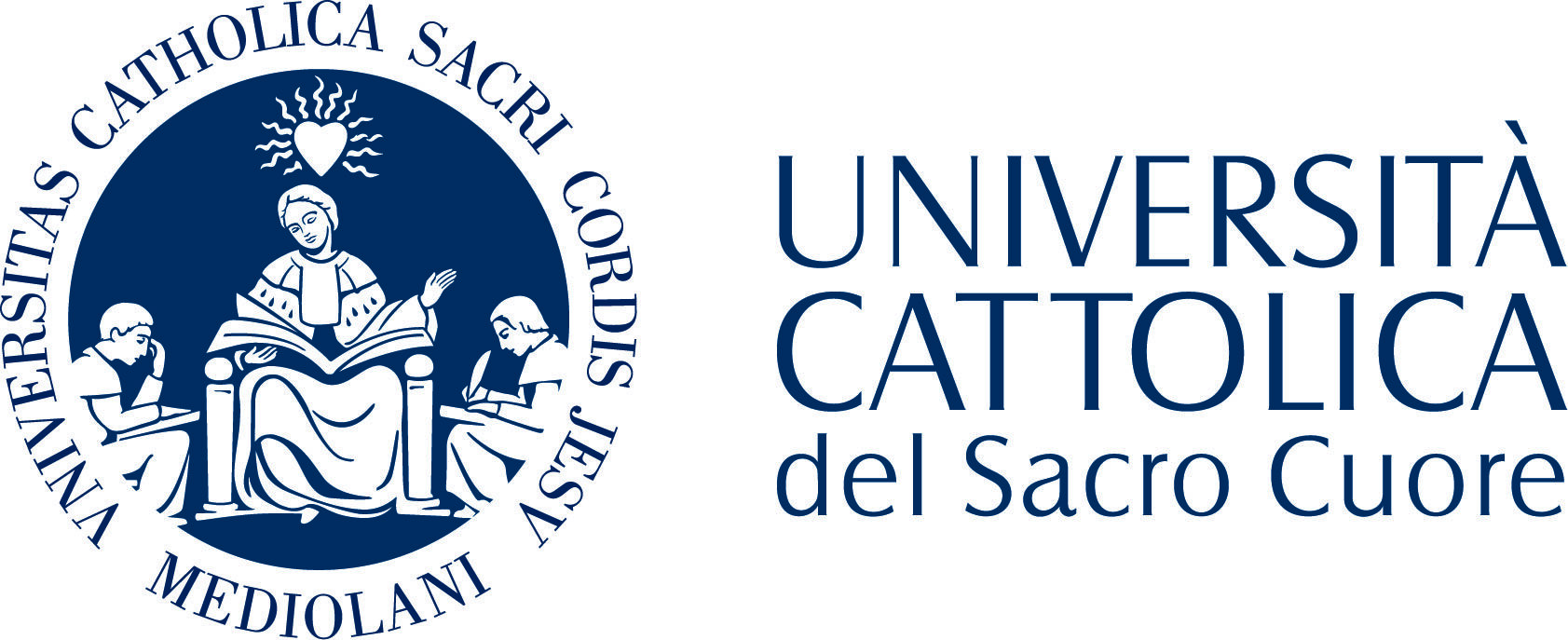Series of Online Seminars
April-May 2021
StreamYard Platform and Facebook live streaming
Introduction
In the context of the migrant and refugee crisis, the EU Member States and the European Union itself have recently demonstrated sensitivity toward exploring the ways in which media, the arts and performative practices are able to both facilitate intercultural dialogue among migrant and host communities – thereby empowering their participation in social life –, and to promote cultural diversity (different ethnic, cultural, religious and linguistic backgrounds and heritage) within European societies. Indeed, different “liberal” and “applied” arts (film, theatre & performance, photography, crafts, architecture, design, etc.) as well as emerging cross-media forms (interactive and social media, games, street art, circus and performative practices, etc.), have a pivotal role to play in this direction. In a nutshell, “artistic and cultural expressions can help us to communicate with each other, in an immediate manner, and allow us to understand our similarities as well our differences, in an area where we must also resolve disputes “(Report How culture and the arts can promote intercultural dialogue in the context of the migratory and refugee crisis, 2017, p. 10).
Despite this high potential for opening new perspectives on EU societies based on integration and a willingness to engage in dialogue, these guidelines seem mostly unexplored and little discussed within the academic communities – primarily focused on the current regime of representation of migrant people and newcomers. Moreover, it can hardly be disregarded that a practical implementation of these guidelines faces many difficulties: national cultural policies affect cultural productions by institutionalizing the process of othering through rhetorical discourses and hegemonic representations; the projects and practices in this field are often vital but fragmented and poorly reciprocally connected (also due to their strong roots in specific areas and territories); the skills and professional figures associated with these processes are poorly defined and have no particular training centres; and finally, the evaluation methods of the initiatives are different and lacking consolidated protocols. The combination of all these factors produces a fundamental weakness in a sector that in any case, remains extremely lively and promising.
On this basis, and within the framework of a research program that the UCSC’s Department of Communication Sciences and Performing Arts has been developing over the last two years (Migrations / Mediations. Media and performative arts as tools for the intercultural dialogue: https://www.migrations-mediations.com/), this series of Webinars intends to start a reflection with academic and independent researchers, artists, cultural providers, public and private funders, and policymakers – both at a local and at an international level – with the aims to:
– Reflect on the role of media, arts and culture in the management of policies devoted to migration phenomena, also on the basis of an exchange of best and worst practices;
– Focus on the ways and the degrees in which media, arts and culture have been considered as critical tools for intercultural dialogue by policymakers, at different levels (local, national, European).
– Draw attention to the ways through which artists and cultural providers can create and develop models of action in territories oriented toward bringing host populations into contact with migrants and refugees, as well as to empower newcomers themselves by offering a space for dialogue and a basis for voice-attaining and self-organising;
– Empower the professional figure of the cultural provider in contexts of intercultural and shifting societies, by defining its skills, methods of work, and formation paths.
– Develop a specific set of tools and a methodology to assess the social, cultural and economic impact of intercultural dialogue activities through arts, media and culture. Along with quantitative indicators of success, such as counting audiences reached or scoring intercultural stakeholders included in the action, it is worthwhile to elaborate new models of evaluation for the measurement and assessment of the efficiency and effectiveness of such projects.
Organizing Committee
Ruggero Eugeni (coordinator), Alice Cati, Martina Guerinoni, Laura Peja, Maria Francesca Piredda, Anna Sfardini, Matteo Tarantino
Seminars Program

April, 15 – 6.00-7.30 p.m.
Seminar 1
Speakers:
– Angelique Petrits (European Commission, Unit C.2 – Legal Pathways and Integration) From integration to inclusion: why culture matters and how to build a positive narrative
– Giuseppe Fidotta (Concordia University Canada): Migration and the Circuits of Film Culture: A Southern Perspective
Chair:
– Ruggero Eugeni (Università Cattolica del Sacro Cuore)
Click here to subscribe

April, 26 – 6.00-7.30 p.m.
Seminar 2
Beyond the Emergency. Media representations, social encounters and transculturality
Speakers:
– Pierluigi Musarò (Alma Mater Università degli studi di Bologna – Atlas of Transitions)
– Guglielmo Schininà (IOM – UN migration)
Chair:
– Laura Peja (Università Cattolica del Sacro Cuore)
Click here to subscribe

May, 19 – 6.00-7.30 p.m.
Seminar 3
We tell a different story – the role of documentary film, alternative and community media in reporting migration
Speakers:
– Daniela Drastata, Chair of the EBU TV Intercultural and Diversity Group, Senior editor at HRT (Croatian National Radio and Television), Executive co-producer of the EBU New Neighbours series
– Clara Dominguez, Division Director & VOA Director of Partnerships, Latin America Broadcasting, Voice of America
– Fran Atopos Conte, journalist and director, Termini TV
– Nyima Jadama, TV host of Nyimas Bantaba at ALEX Berlin
Moderator:
– Nadia Bellardi, transcultural media consultant https://www.transcultural-consulting.org
Chair:
– Alice Cati (Università Cattolica del Sacro Cuore)
Click here to subscribe
